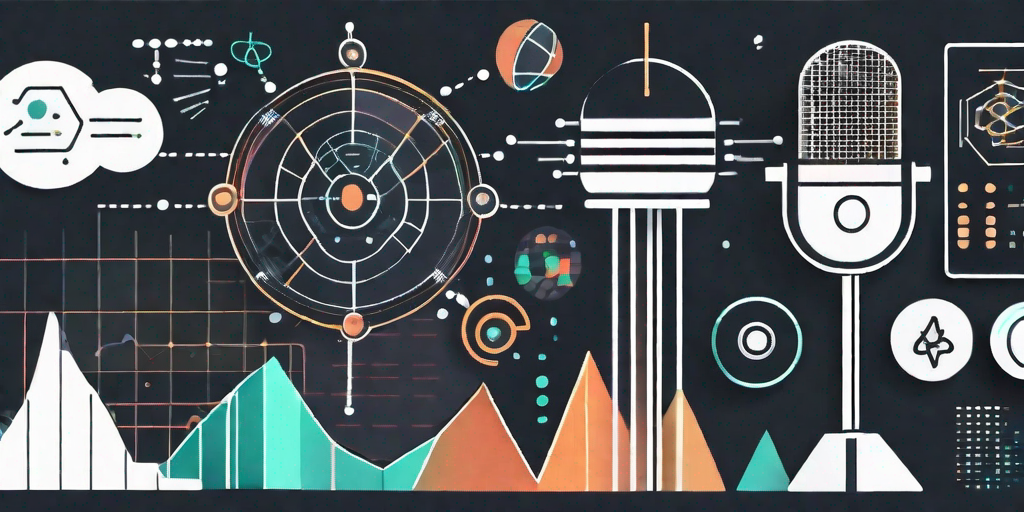Understand Data Science with Help from an Innovation Speaker

Understand Data Science with Help from an Innovation Speaker
Data science has become an increasingly crucial field in today's digital age. With the vast amount of data generated every second, businesses are constantly seeking ways to unlock insights and gain a competitive edge. However, the complexity of data science can often be overwhelming, especially for those who are not familiar with the field. That's where an innovation speaker can play a valuable role in simplifying the concepts and making data science more accessible to everyone.
Understanding the Basics of Data Science
Before delving into the role of an innovation speaker in simplifying data science, it's important to have a solid understanding of the basics. Data science is an interdisciplinary field that involves using scientific methods, processes, algorithms, and systems to extract knowledge and insights from structured and unstructured data.
At its core, data science is about uncovering hidden patterns and extracting meaningful information from vast amounts of data. This process requires a combination of mathematical and statistical knowledge, as well as expertise in computer science and domain-specific areas.
Data scientists utilize various tools, techniques, and programming languages such as Python and R to collect, clean, analyze, and visualize data. These programming languages provide a wide range of libraries and frameworks specifically designed for data manipulation and analysis.
One of the key steps in data science is data collection. This involves gathering relevant data from various sources, such as databases, APIs, or even web scraping. Data scientists need to ensure that the collected data is accurate, complete, and representative of the problem they are trying to solve.
Once the data is collected, data scientists need to clean and preprocess it. This involves handling missing values, removing outliers, and transforming the data into a suitable format for analysis. Data cleaning is a crucial step as it directly impacts the quality and reliability of the insights derived from the data.
After cleaning the data, data scientists can start analyzing it. They use statistical models, machine learning algorithms, and data mining techniques to uncover patterns, trends, and correlations in the data. These techniques allow them to make predictions, classify data, or identify anomalies.
Visualization is another important aspect of data science. Data scientists use various visualization techniques to present their findings in a clear and concise manner. Visualizations can range from simple bar charts and scatter plots to more complex interactive dashboards.
Ultimately, the goal of data science is to extract actionable insights from data that can drive informed business decisions. By leveraging the power of data, organizations can gain a competitive edge, optimize their operations, and identify new opportunities for growth.
In conclusion, data science is a multidisciplinary field that combines mathematics, statistics, computer science, and domain expertise to analyze and interpret data. It involves various steps such as data collection, cleaning, analysis, and visualization, with the ultimate aim of extracting valuable insights that can drive business success.
Role of an Innovation Speaker in Simplifying Data Science
Data science can often seem like a daunting subject, filled with complex algorithms, mathematical equations, and technical jargon. This is where the role of an innovation speaker becomes invaluable. An innovation speaker is skilled in breaking down complex concepts into simple, relatable terms that anyone can understand.
Imagine attending a conference on data science, feeling overwhelmed by the sheer amount of information being presented. Suddenly, the innovation speaker takes the stage and captivates the audience with a compelling story. They start by sharing a real-life example of how data science revolutionized a small business, transforming it from struggling to thriving. As the speaker delves into the details, they use analogies to compare data algorithms to puzzle pieces, fitting together to reveal valuable insights.
The innovation speaker's storytelling ability keeps the audience engaged and eager to learn more. They seamlessly transition into explaining machine learning algorithms, using a relatable analogy of a self-driving car. Just like a self-driving car learns from its surroundings to make informed decisions, machine learning algorithms learn from data to make accurate predictions. By drawing parallels between everyday experiences and data science concepts, the innovation speaker makes the subject matter relatable and understandable for everyone in the room.
Furthermore, the innovation speaker understands that not everyone in the audience has a technical background. They take this into account and ensure that their presentation is accessible to all. They avoid overwhelming the audience with technical jargon and instead focus on conveying the essence of data science in a way that resonates with everyone.
Another aspect that sets an innovation speaker apart is their ability to make the subject matter entertaining. They infuse their presentation with humor, captivating anecdotes, and interactive elements. They might use a live demonstration to showcase how data science can predict consumer behavior, leaving the audience in awe of its power and potential.
Ultimately, the role of an innovation speaker in simplifying data science is to bridge the gap between complexity and understanding. They have the unique talent of transforming intricate concepts into digestible information, empowering individuals to embrace data science and its applications. By using real-life examples, analogies, and engaging storytelling, an innovation speaker brings data science to life, making it accessible and relatable to all.
The Importance of Data Science in Today's Business World
In today's rapidly evolving business landscape, data science has become indispensable. Organizations across industries are leveraging data science to gain insights into customer behavior, optimize operations, and drive innovation. Data science enables businesses to analyze large volumes of data quickly and accurately, empowering them to make data-driven decisions and stay ahead of the competition.
With the increasing availability of data and advancements in technology, the role of data science has expanded beyond traditional analytics. It now encompasses a wide range of techniques and tools, including machine learning, artificial intelligence, and predictive modeling. These advanced capabilities allow businesses to not only analyze historical data but also predict future trends and outcomes.
One area where data science has had a significant impact is in customer behavior analysis. By analyzing customer data, businesses can gain insights into their preferences, purchasing patterns, and satisfaction levels. This information can then be used to personalize marketing campaigns, improve customer service, and develop new products and services that meet the specific needs of their target audience.
Data science also plays a crucial role in optimizing operations and improving efficiency. By analyzing operational data, businesses can identify bottlenecks, streamline processes, and reduce costs. For example, a manufacturing company can use data science techniques to identify the optimal production schedule, minimizing downtime and maximizing productivity.
Furthermore, data science is driving innovation by enabling businesses to uncover new opportunities and develop groundbreaking solutions. By analyzing market data and consumer trends, businesses can identify emerging markets, spot untapped niches, and develop innovative products and services. This not only helps businesses stay competitive but also fosters a culture of innovation and continuous improvement.
By understanding the importance of data science, professionals from all backgrounds can better understand how it can impact their work. An innovation speaker can shed light on the various applications of data science across industries and showcase real-world examples of how it has transformed businesses. This knowledge can be invaluable in empowering individuals to embrace data-driven approaches and leverage data science to drive growth and success.
Moreover, data science is not limited to large corporations. Small and medium-sized enterprises (SMEs) can also benefit from data science by leveraging cloud-based analytics platforms and outsourcing data analysis tasks. This allows SMEs to access advanced analytics capabilities without the need for significant upfront investments in infrastructure and expertise.
Additionally, data science is playing a crucial role in the healthcare industry. By analyzing patient data, medical professionals can identify patterns and trends that can help in early disease detection, personalized treatment plans, and improving overall patient outcomes. Data science is also being used to develop predictive models that can forecast disease outbreaks, enabling healthcare organizations to allocate resources effectively and respond proactively to public health emergencies.
In conclusion, data science is revolutionizing the way businesses operate and make decisions. It empowers organizations to analyze vast amounts of data, gain valuable insights, and drive innovation. By embracing data-driven approaches and leveraging the power of data science, businesses can stay ahead of the competition and achieve long-term success.
How Innovation Speakers Break Down Complex Data Science Concepts
So how do innovation speakers simplify complex data science concepts? They utilize a variety of techniques and strategies to make the subject matter more digestible and engaging. One approach is to use relatable examples that everyone can connect with. By drawing parallels between everyday experiences and data science principles, innovation speakers can make the concepts more relatable and memorable.
Innovation speakers also use visual aids, such as charts and diagrams, to help illustrate and simplify complex data science concepts. Visual representations can often convey information more effectively than words, making it easier for the audience to understand and retain the information being presented.
Additionally, innovation speakers often incorporate interactive elements into their presentations. This allows the audience to actively participate and engage with the material, making the learning experience more immersive and enjoyable. By encouraging questions, discussions, and hands-on activities, innovation speakers create a dynamic and interactive atmosphere where everyone feels involved and invested in the subject matter.
Turning Data Science Knowledge Into Actionable Business Strategies
While understanding the basics of data science is important, the true value lies in being able to apply that knowledge to real-world scenarios. An innovation speaker can help bridge the gap between theory and practice by demonstrating how data science can be used to create actionable business strategies.
Through case studies, success stories, and practical examples, innovation speakers can show how data science has been successfully implemented in various industries. They can highlight the key steps involved in converting data into actionable insights, and how those insights can be leveraged to drive tangible business outcomes.
By understanding how data science can be applied to their own work, professionals can unlock the power of data and make informed decisions that have a real impact. An innovation speaker can inspire individuals to embrace data science as a tool for innovation and growth, empowering them to drive positive change within their organizations.
Conclusion
In summary, data science is a complex field that plays a crucial role in today's business world. However, it can often be overwhelming for those who are not familiar with the subject. This is where an innovation speaker can make a significant difference. By simplifying complex data science concepts, an innovation speaker can make the field more accessible and relatable to all individuals, regardless of their technical background. By understanding the basics of data science and its importance in today's business landscape, professionals can leverage the power of data to drive informed decisions and achieve business success.
FAQ
1. What is data science?
Data science is an interdisciplinary field that involves using scientific methods, processes, algorithms, and systems to extract knowledge and insights from structured and unstructured data. It involves steps such as data collection, cleaning, analysis, and visualization to uncover patterns and make predictions.
2. How can an innovation speaker simplify data science?
An innovation speaker can simplify data science by breaking down complex concepts into simple, relatable terms. They use storytelling, analogies, and real-life examples to make the subject matter more accessible and understandable for everyone, regardless of their technical background.
3. Why is data science important in today's business world?
Data science is important in today's business world because it enables organizations to gain insights into customer behavior, optimize operations, and drive innovation. By analyzing data, businesses can make data-driven decisions, personalize marketing campaigns, improve efficiency, and identify new opportunities for growth.
Contact Dr Mark van Rijmenam, an Innovation Speaker for Your Event
If you've been captivated by the potential of data science and its transformative impact on business, why not bring this fascinating subject to life at your next event? Dr Mark van Rijmenam, an esteemed innovation speaker, is renowned for his ability to demystify complex data science concepts and make them accessible and engaging for all. With his unique blend of storytelling, real-world examples, and interactive demonstrations, Dr van Rijmenam will captivate your audience, leaving them inspired and informed. Don't miss this opportunity to bring a fresh perspective to your event and empower your attendees with the knowledge to leverage data science for business success. Simply complete the form below and we will be in touch within 24 hours to discuss how Dr van Rijmenam can make your event unforgettable.




